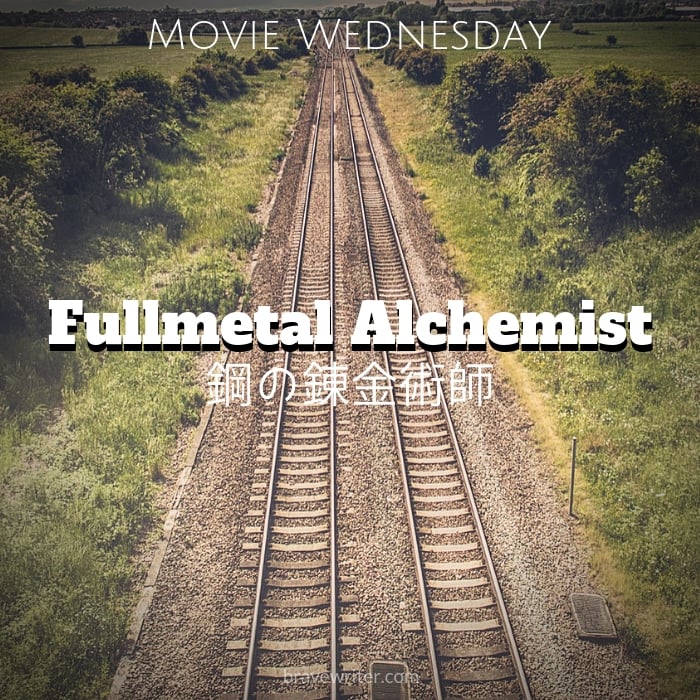Movie Wednesday: Fullmetal Alchemist

by Amy Frantz, Brave Writer alum
After the sudden death of their mother, brothers Edward and Alphonse Elric attempt to use alchemy to bring her back to life. But when it goes horribly wrong, the young boys are left with dire consequences. Edward loses an arm and a leg in the attempt and must bind his little brother’s soul to a suit of armor to keep Alphonse alive.
Years later, Edward has become a renowned State Alchemist, known as the Fullmetal Alchemist because of his metal prosthetic limbs. Now bent on returning Alphonse to his proper body, Edward will stop at nothing to find the Philosopher’s Stone, which he believes will grant him the power to set things right. But strong forces outside the two brothers conspire to keep them from their goal.
[This post contains Amazon affiliate links. When you click on those links to make purchases,
Brave Writer receives compensation at no extra cost to you. Thank you!]
Fullmetal Alchemist is a Netflix original film and a fantasy science fiction movie released in 2017. Directed by Fumihiko Sori, it is a live action adaptation of the award-winning and worldwide best-selling manga (Japanese comic) series of the same name by Hiromu Arakawa.
In recent years, there has been a string of live action adaptations of Japanese manga, many of which have received heavy criticism for whitewashing. Fullmetal Alchemist is a notable exception to this trend. Although set in a fantastical, fictionalized Europe, the movie’s characters are all played by Japanese actors. A common argument against including representation in genre films has been that its presence would somehow need an explanation from the narrative. Fullmetal Alchemist never does this and simply centers Japanese actors without making it a narrative point.
Among the film’s central themes are familial love, trust and loyalty, perseverance, learning from mistakes, and that all actions have consequences that cannot be cheated.
A note to parents: Fullmetal Alchemist is rated TV-14 (roughly the equivalent of PG-13) and is intended for older teen audiences. Parents should be aware that it contains dark themes and intense fantasy violence (particularly in its last third). We recommend looking up the film on sites like Common Sense Media before deciding if it is right for your family.
Discussion Questions
- A major theme of Fullmetal Alchemist is the principle of equivalent exchange; that in order to create something new, something old must be destroyed/given up. In what ways does the film illustrate this theme outside of the obvious alchemy?
- Condensing and omission are necessities of the adaptation process, especially when trying to adapt a long-running comic series into a two hour film. Were there ever any moments in the film where you felt something wasn’t well explained or that something was missing, or did you feel the film’s narrative held together on its own? Explain your answer.
- Towards the end of the film, one of the Homunculi observes that because she can die then she is human. What do you think this definition of humanity implies about her character?
- At the end of the film, Ed decides not to use the Philosopher’s Stone to bring Al’s body back. Do you agree with his decision? Why or why not?
Additional Resources
Fullmetal Alchemist is streaming on Netflix.
Amy Frantz is a Brave Writer alum. When not over-analyzing Star Wars, she spent much of her teens building a rather large manga collection.
Tags: Diversity


















